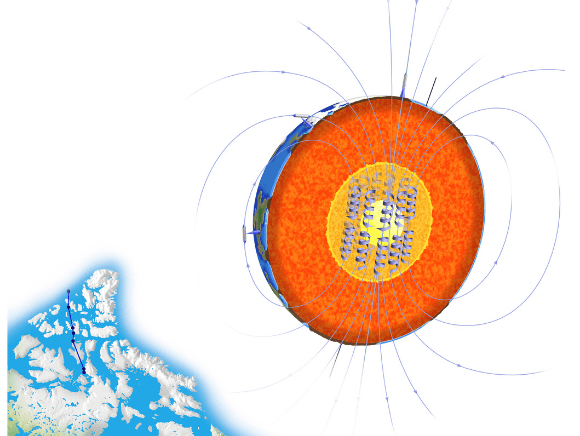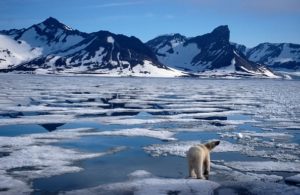A recent paper in Science links the reversal of the magnetic poles 42,000 years ago to advances in glaciers and a cooling climate. It may have contributed to wiping out the Neanderthals and can teach us about what soon is in store for humans. It is one of several mainstream science papers in 2021 to imply that climate computer models exaggerate human-made global warming.
Pole Flips
The earth has two north poles. One is the planet’s rotational axis, and the other is the magnetic north pole. They are almost the same, enabling us to use magnetic compasses to find the north.
 Almost, but not entirely. The magnetic north pole is currently about 600 miles from the geographic one. However, only a hundred years ago, it was in Northern Canada. It’s on the move, and in the last two decades, it has practically raced toward Siberia at a whopping speed of about 35 miles per year. You may not be impressed, but scientists say it is moving so fast that they believe a polar flip might be on the way. The magnetic north pole will then be near the geographic south pole.
Almost, but not entirely. The magnetic north pole is currently about 600 miles from the geographic one. However, only a hundred years ago, it was in Northern Canada. It’s on the move, and in the last two decades, it has practically raced toward Siberia at a whopping speed of about 35 miles per year. You may not be impressed, but scientists say it is moving so fast that they believe a polar flip might be on the way. The magnetic north pole will then be near the geographic south pole.
Such pole reversals are surprisingly common in earth’s history. During the last 83 million years, 183 have occurred, one every 450,000 years on average. The last one, called the Laschamps Event, occurred around 42,000 years ago. During the transition, the strength of the geomagnetic field dropped by 95%, allowing more cosmic rays to bombard our planet.
New Study
Since we might be in the middle of a reversal, scientists are eager to determine if such events have any climatic or environmental impacts. Until recently, the data has been limited, but the paper published in Science created a precisely dated radiocarbon record of the Laschamps Event. It documented a significant elevation of the carbon-14 isotope used to measure cosmic rays.
With such a detailed record, the researchers could match changes to the climatic recorded in peat bogs, caves, and ice cores worldwide. They concluded that the Laschamps Event was associated with significant glacier advances, cooling, and climate change. They also note that it coincides with the rapid decline of the Neanderthals and other extinction events.
Svensmark Effect
The most exciting aspect of this study might be what is never stated, namely that it links increased cosmic rays to cooling. A theory by Dr. Henrik Svensmark postulates that cosmic rays are linked to cloud production, and he has demonstrated this mechanism in CERN.
His theory is controversial because it implies that the sun plays a much more significant role in climate change than acknowledged by the IPCC. If he is correct, much of the warming in the 20th century is natural. The new Laschamps Event study indirectly supports the Svensmark effect, and it means that if the magnetic pole flips, we could experience dramatic global cooling.
~ Read more from Caroline Adana.





